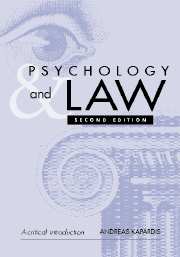Book contents
- Frontmatter
- Contents
- List of case studies
- Acknowledgements
- Foreword
- 1 Psycholegal research: an introduction
- 2 Eyewitnesses: key issues and event characteristics
- 3 Eyewitnesses: the perpetrator and interviewing
- 4 Children as witnesses
- 5 The jury
- 6 Sentencing as a human process
- 7 The psychologists as expert witnesses
- 8 Persuasion in the courtroom
- 9 Detecting deception
- 10 Witness recognition procedures
- 11 Psychology and the police
- 12 Conclusions
- Notes
- References
- Author index
- Subject Index
8 - Persuasion in the courtroom
Published online by Cambridge University Press: 05 December 2011
- Frontmatter
- Contents
- List of case studies
- Acknowledgements
- Foreword
- 1 Psycholegal research: an introduction
- 2 Eyewitnesses: key issues and event characteristics
- 3 Eyewitnesses: the perpetrator and interviewing
- 4 Children as witnesses
- 5 The jury
- 6 Sentencing as a human process
- 7 The psychologists as expert witnesses
- 8 Persuasion in the courtroom
- 9 Detecting deception
- 10 Witness recognition procedures
- 11 Psychology and the police
- 12 Conclusions
- Notes
- References
- Author index
- Subject Index
Summary
‘Appearing as an advocate in court is the most challenging thing a lawyer can do: it is the sharp end of lawyering and it calls not only for courage but a great deal of skill as well.’ (Evans, 1995:vii)
‘the feeling is [among practitioners] that the skills for the job of advocacy bear little or no relation to that knowledge most cherished by the law schools or by the Law Society's examining boards.’ (Mungham and Thomas, 1979:174)
‘Writing in a magazine in January 1889 Oscar Wilde … complained that, with the possible exception of the speeches of barristers, lying as an art had decayed.’ (Barnes, 1994:1)
‘When a court hears two competing accounts about what happened it must choose between them. One account will be more persuasive than the other. But what makes it more persuasive? The facts are very important, though they need to be told in an interesting way, and the witness as storyteller needs to be believable.’ (Selby, 2000:55)
Introduction
Law is a difficult course to get into at most universities. Being a practising lawyer confers social status in many countries and there is a strong tendency internationally to include judges on committees that are entrusted with important tasks in society. Such status seems to be synonymous with being a distinguished trial lawyer, a senior barrister in Great Britain and in the Commonwealth and, especially, becoming one of that elite group of Queen's Counsels who can command impressive fees.
- Type
- Chapter
- Information
- Psychology and LawA Critical Introduction, pp. 208 - 224Publisher: Cambridge University PressPrint publication year: 2002

